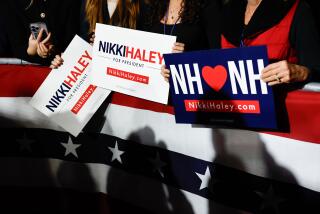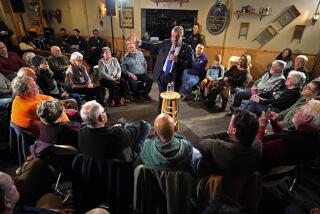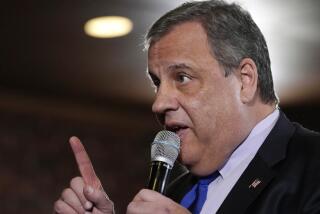Buchanan Steps Up Campaign as Dole Remains Confident
- Share via
COLUMBIA, S.C. — Running on adrenaline and enthusiasm, Patrick J. Buchanan raced from state to state Wednesday in a frenetic attempt to translate his squeaker of a win in New Hampshire into a broader assertion of dominance over the now freewheeling Republican presidential primary race.
From South Carolina westward to South Dakota and Colorado, the Republican hopeful reemphasized the social conservatism that served him well in Iowa, but he also continued to press the economic populism that fueled his surprise victory over Senate Majority Leader Bob Dole in Tuesday’s Granite State primary.
And, while not calling himself a front-runner, he insisted that he is capable of winning the nomination. “We’re in touch with the voters,” he declared in an early morning interview. “I think we can bring them home.”
All day, Buchanan demonstrated the fleetness that has come to define his campaign and has helped propel him into the spotlight on the strength of the New Hampshire victory and a strong second-place showing in Iowa.
At dawn, he started with a regimen of early morning talk shows on four networks, then taped a commercial for use in Arizona--illegal immigration was among the topics--and headed to a morning rally here, where he won the endorsement of prominent conservative activist Phyllis Schlafly.
As for Dole, stripped of the inevitability that has enveloped him since his campaign began, he grudgingly congratulated Buchanan but served notice that he still considers himself in control of the race.
“Hang on to your seats; hang on to your seat belts, whatever,” he told reporters in Manchester, N.H., in a loose interpretation of the old Bette Davis line. “The ride has just begun. When it’s all over, Bob Dole will be the Republican nominee.”
Indeed, the race has become an increasingly wild ride. A contest that once was predicted to be pretty much concluded after Iowa and New Hampshire now holds the promise of extensive, bruising and high-decibel battling for weeks, and perhaps into the March 26 California primary.
As he sought to right his campaign, Dole looked for sustenance in his native Midwest. “We’re here in the heartland,” he said in Sioux Falls, S.D. “This is a battle for the heart and soul of the Republican Party, and we’re going to take it back from Pat Buchanan.”
Contenders
Dole and third-place finisher Lamar Alexander simultaneously echoed and dismissed each other, each contending that it has come down to a two-man fight between himself and Buchanan. Declaring that Dole is “out of touch,” Alexander aggressively sought the mantle of establishment candidate against the upstart Buchanan, decrying “Buchananism” and its threat to the GOP’s chances in November.
“Pat Buchanan does not put ‘America first,’ ” said Alexander, in a tart takeoff on Buchanan’s slogan. “Pat Buchanan puts America last. The way to put America first is to recognize our responsibilities in the world.”
The other man still theoretically alive in the race, multimillionaire publisher Steve Forbes, spent the day insisting that his disappointing fourth-place finish in New Hampshire did not spell the end to his campaign.
“They wish,” said Forbes, who with his riches does not, like Alexander and Buchanan, have to worry about replenishing thinned campaign accounts. “We’re in it for the duration.”
With all of the New Hampshire vote counted, Buchanan had 28% to Dole’s 27%, while Alexander won 23% and Forbes 12%. While Buchanan finished ahead of Dole, there was some irony: The former commentator actually drew 8,100 fewer votes than he had in 1992 against President Bush. Dole, in contrast, won 10,000 more votes than he had in 1988, his previous loss in New Hampshire.
The results jangled not only the nerves of the Dole campaign but also those of its allies in the traditional wing of the Republican Party. Within the GOP, many fear that Buchanan’s positions will backfire on Republicans in the fall.
An example of the concern at the highest levels of the GOP is a planned address Friday by Republican National Committee Chairman Haley Barbour. According to party sources, Barbour is to reaffirm support for free trade, a notion Buchanan has belittled as ruinous to middle-class workers.
Barbour insisted, however, that he remains neutral in the race. “I ain’t got a dog in that fight,” he said.
Another signal came from former Joint Chiefs of Staff Chairman Colin L. Powell, whose flirtation with the presidential race last year left many Republicans with an unrequited passion for his candidacy. In an evening interview with ABC News, Powell said that Buchanan is sending the “wrong message.”
“This is not the time for intolerance,” said Powell, adding that he could not vote for Buchanan.
Buchanan, apprised of Powell’s remarks, said he respects the retired general. But he stood his ground. “I think you’ll find that Pat Buchanan is going to bring back into this Republican Party a lot of people who have been driven out by what they consider insensitive policies and a lot of people who have been left out.”
Despite his newly reemphasized weakness, Dole still holds somewhat of an advantage because of his campaign’s relatively robust financial status as the candidates approach a crush of primaries.
While Dole is well-organized in many states, Alexander must count on a preternaturally hasty infusion of money to allow him to compete strongly elsewhere in the nation.
Buchanan, less dependent than Alexander or Dole on donations because of the guerrilla nature of his campaign, nonetheless still needs money to compete. His campaign treasurer, Scott Mackenzie, said Wednesday that Buchanan had raised $700,000, twice his earlier pace, in the week between Iowa and New Hampshire and were expecting a “pretty big spike” given the latest campaign results.
The sheer geographic breadth of the contests now approaching was demonstrated by the candidates’ schedules as they departed New Hampshire.
Buchanan flew Tuesday night to South Carolina, then west to South Dakota and ended the day in Denver, where about 1,000 supporters greeted him. Dole began the day in New Hampshire, then hit both Dakotas and finished off in Colorado. Alexander began in New Hampshire, had a Georgia appearance canceled by bad weather and instead journeyed to South Carolina.
All of those states loom on the campaign calendar. South Carolina, which is shaping up as Dole’s firewall before later Southern primaries, holds its primary March 2. North and South Dakota, along with Arizona--which at least two of the candidates plan to visit today--will hold theirs Tuesday. A candidates’ forum was scheduled for tonight in Phoenix, but it was unclear whether Dole would attend. On March 5, nine states, from Minnesota to Maine and Colorado to Georgia, hold primaries.
Even if he were at a disadvantage to Dole, Buchanan was certainly ceding no territory Wednesday. Brimming with a victor’s euphoria, he started the day in Columbia, S.C., rallying social conservatives with a return to the anti-abortion rhetoric that dominated his Iowa campaign. Schlafly endorsed him there as “the one candidate who can win, who we know respects the fundamental individual right to life of the unborn baby.”
Not to favor one part of his coalition over the other, Buchanan followed an argument against abortion with a plea for the votes of dispossessed workers.
“No industry in America has suffered more from the Beltway betrayals and those trade deals than the textile industries upon which South Carolina has so long depended,” he said.
The afternoon brought Buchanan and his somewhat ragged and sleepless campaign entourage to Mt. Rushmore, in the Black Hills of South Dakota, where, with the stone backdrop of four presidents, he renewed his call for protectionist trade policies.
“All four of these gentlemen up on Mt. Rushmore agreed with Pat Buchanan,” he said. “Washington, Jefferson, Lincoln and Theodore Roosevelt all believed that the American economy was designed for the American worker and the American family.”
Covering much of the same territory as Buchanan was Dole, but there the comparisons stop. Buchanan’s euphoria was greeted by Dole’s urgent effort to limit New Hampshire’s fallout.
“This is a little bump in the road, not a very big bump,” he said in Manchester, N.H., during an early morning press conference.
Campaign aides blamed much of Dole’s showing on negative advertising by Forbes, but Dole himself was focused on Buchanan and on defining the race as one between the two of them.
“This is now a race between the mainstream and the extreme,” Dole said. “That’s what it’s all about. It’s about freedom and intolerance, which I will not tolerate. It has no place in our party.”
Asked if he was implying that Buchanan is racist, Dole added that “I think there’s some code words” in Buchanan’s language.
But in a reminder of the narrow line he must tread, Dole’s remarks raised hackles among Christian Coalition leaders. “When religious conservatives hear those words, it is the voice of Bob Dole but the face of Arlen Specter,” one said.
‘The Real Dole’
Dole seemed to acknowledge Wednesday the criticisms that his performance thus far has been deemed underwhelming by voters and party operatives. “You’re going to see the real Bob Dole out there from now on,” he said.
In New Hampshire at the start of his day, he referred to Buchanan’s 28% tally as a “sizeable vote.”
“We’re listening. We get the message,” Dole said.
Dole indicated that he will now spend more time as a candidate and less in Washington. His work in the Senate kept him off the campaign trail much of the early political season.
“We’re not going to be taken away by Senate business,” he said.
Despite his relative optimism, Dole made little progress on one of his desires: whittling the list of candidates. None of the lesser-finishers in New Hampshire, not even Sen. Richard G. Lugar of Indiana, who got only 5%, indicated any plans to leave the race.
For Alexander, Wednesday brought a return to his Southern base, where political observers believe it is imperative that he win some state in order to lengthen his stay in the race.
Like Buchanan, he took up the subject of trade but from a different angle. The former Tennessee governor told an audience in Columbia, S.C., that the South’s resurgence had been built on exports, which would be gravely threatened by Buchanan’s policies.
“The South I know is not a protectionist South,” he said. “The South is not a backward South.
Alexander offered himself as a “Republican governor from the new South with a conservative vision for the future” and insisted that he would be financially able to compete in the primaries.
In New Hampshire, he made much of the fact that he was staying largely out of the negative fray. Now, however, “I’m going onto a battlefield, and I think I ought to have the opportunity to defend myself,” he said.
Fourth-place finisher Forbes spent the evening in Delaware, where he is hoping to succeed in the Saturday primary. He and former candidate Phil Gramm were the only entrants who campaigned strongly there.
Through his campaign manager, Bill Dal Col, Forbes also signaled his intent to compete in the March 7 New York primary. Forbes and Dole are the only candidates who successfully navigated the byzantine New York rules to appear on the ballot in each district there.
Also contributing to this report were Times staff writers Ronald Brownstein, Edwin Chen, Michael A. Hiltzik and Bob Sipchen. It was written by Times political writer Cathleen Decker.
More to Read
Get the L.A. Times Politics newsletter
Deeply reported insights into legislation, politics and policy from Sacramento, Washington and beyond. In your inbox twice per week.
You may occasionally receive promotional content from the Los Angeles Times.











